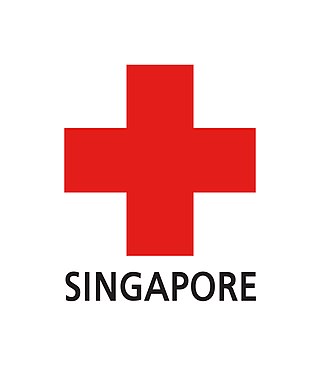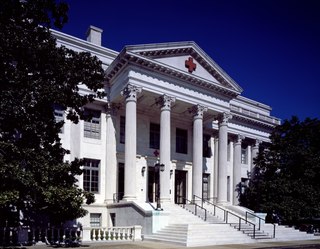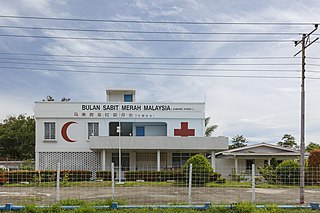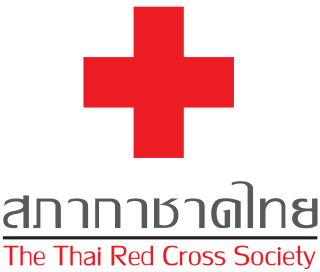Related Research Articles

The Department for International Development (DFID) was a department of HM Government responsible for administering foreign aid from 1997 to 2020. The goal of the department was "to promote sustainable development and eliminate world poverty". DFID was headed by the United Kingdom's Secretary of State for International Development. The position was last held by Anne-Marie Trevelyan, who assumed office on 13 February 2020 and served until the department was dissolved on 2 September 2020. In a 2010 report by the Development Assistance Committee, the department was described as "an international development leader in times of global crisis". The UK aid logo is often used to publicly acknowledge DFID's development programmes are funded by UK taxpayers.

Humanitarian aid is material and logistic assistance, usually in the short-term, to people in need. Among the people in need are the homeless, refugees, and victims of natural disasters, wars, and famines. The primary objective of humanitarian aid is to save lives, alleviate suffering, and maintain human dignity.

The Canadian Red Cross Society is a Canadian humanitarian charitable organization, and one of 192 national Red Cross and Red Crescent societies. The organization receives funding from both private donations and from Canadian government departments.

Hurricane Iris was a small, but powerful Category 4 hurricane that caused widespread destruction in Belize. Iris was the second-strongest storm of the 2001 Atlantic hurricane season, behind Hurricane Michelle. It was the ninth named storm, fifth hurricane, and third major hurricane of the year, forming from a tropical wave on October 4 just southeast of Barbados. It moved westward through the Caribbean, intensifying into a tropical storm on October 5 south of Puerto Rico, and into a hurricane on the following day. While passing south of the Dominican Republic, Iris dropped heavy rainfall that caused landslides, killing eight people. Later, the hurricane passed south of Jamaica, where it destroyed two houses. On reaching the western Caribbean Sea, Iris rapidly intensified into a Category 4 on the Saffir–Simpson scale. A small hurricane with an eye of only 7 mi (11 km) in diameter, Iris reached peak winds of 145 mph (233 km/h) before making landfall in southern Belize near Monkey River Town on October 9. The hurricane quickly dissipated over Central America, although its remnants contributed to the formation of Tropical Storm Manuel in the eastern Pacific Ocean. The hurricane caused severe damage—destroying homes, flooding streets, and leveling trees—in coastal towns south of Belize City.

Islamic Relief Worldwide is a faith-inspired humanitarian and development agency which is working to support and empower the world's most vulnerable people.
The British Red Cross Society is the United Kingdom body of the worldwide neutral and impartial humanitarian network the International Red Cross and Red Crescent Movement. The society was formed in 1870, and is a registered charity with more than 17,200 volunteers and 3,400 staff. At the heart of their work is providing help to people in crisis, both in the UK and overseas. The Red Cross is committed to helping people without discrimination, regardless of their ethnic origin, nationality, political beliefs or religion. Queen Elizabeth II was the patron of the society until her death on 8 September 2022.

The Singapore Red Cross (SRC), formally the Singapore Red Cross Society, is a humanitarian aid and community services charity in Singapore. The SRC is a national member of the Federation of Red Cross and Red Crescent Societies (IFRC) and International Committee of the Red Cross (ICRC) and forms a part of the International Red Cross Movement.

Hurricane Emily was a powerful early season Cape Verde hurricane that caused significant damage across the Caribbean to Mexico. It was also the earliest-forming Category 5 Atlantic hurricane on record in a season and the most intense to form before August. At the time, Emily was the earliest-forming fifth named storm in the Atlantic on record; this record has since been surpassed by 2020's Tropical Storm Edouard, and again the following year by 2021's Hurricane Elsa. After forming on July 10, 2005, the storm moved through the central Atlantic Ocean before passing through the Windward Islands on July 14. Tracking generally towards the west-northwest, the storm gradually intensified as it traversed the Caribbean, peaking as a Category 5 hurricane on July 16, marking the earliest date for a storm to do so during the course of a given year. The system subsequently made landfall in the Yucatán Peninsula as a Category 4. Quickly crossing the peninsula, Emily emerged into the Gulf of Mexico and reorganized. On July 20, the storm struck Tamaulipas as a major hurricane and rapidly dissipated within 24 hours. The storm caused significant damage along its path, with up to $1.01 billion in damages recorded, primarily in Mexico. 5 people died in each of Jamaica, Haiti, and Mexico; 2 people died elsewhere, for a total of 17 fatalities.

Tropical Storm Gamma was the 25th storm of the 2005 Atlantic hurricane season. Gamma formed on November 18 from a tropical wave which had left the coast of Africa on November 3. Between November 13 and November 16 the system was designated Tropical Depression Twenty-Seven and moved westward through the Windward Islands into the Caribbean. Although its winds were not of tropical storm force, the storm brought damagingly heavy rainfall to Trinidad and to St. Vincent and the Grenadines.

The American National Red Cross, is a nonprofit humanitarian organization that provides emergency assistance, disaster relief, and disaster preparedness education in the United States. It is the designated US affiliate of the International Federation of Red Cross and Red Crescent Societies and the United States movement to the International Red Cross and Red Crescent Movement.

The Malaysian Red Crescent (MRC) is a voluntary humanitarian organization that seeks to promote humanitarian values, as well as provide service and public education in disaster management, as well as healthcare in the community. It is part of the International Red Cross and Red Crescent Movement.

The International Federation of Red Cross and Red Crescent Societies (IFRC) is a worldwide humanitarian aid organization that reaches 160 million people each year through its 191 member National Societies. It acts before, during and after disasters and health emergencies to meet the needs and improve the lives of vulnerable people. It does so independently and with impartiality as to nationality, race, gender, religious beliefs, class and political opinions.

Uganda Red Cross Society (URCS) is a humanitarian aid and community services charity in Uganda. It is a national member of the International Red Cross and Red Crescent Movement who draws mandates from the Geneva Conventions.
The Sudanese Red Crescent (SRC) is the biggest and most decentralized and widespread humanitarian organization operating in Sudan. The society developed out of the Sudan branch of the British Red Cross Society and was established in 1956. Upon Sudan's independence in March 1956 received official recognition as an independent National Society following the Sudanese Council of Ministers decree No. 869. The National Society covers nearly the entire country with 15 State branches and several sub-branches/units in the provinces/localities and administrative units, with a nationwide community-based network of 35,000 active volunteers and another 300,000 who can be deployed as need arises. It has well-established working relations with public authorities at federal, state and local levels, and good partnership and collaboration with Movement partners and UN specialized agencies and national and international NGOs working in Sudan.

The Thai Red Cross Society is a major humanitarian organisation in Thailand, providing services as part of the International Red Cross and Red Crescent Movement.

New Zealand Red Cross or Rīpeka Whero Aotearoa is a humanitarian organisation, which has more than 9,000 members and volunteers. In New Zealand, Red Cross delivers core community services, such as Meals on Wheels, refugee re-settlement services, first aid courses, and emergency management operations. Internationally, New Zealand Red Cross sends international delegates overseas to assist in areas where humanitarian assistance is needed, this includes disaster preparedness and response. In 2013, 17 delegates were sent to the Philippines in the aftermath of Typhoon Haiyan and in 2014, 18 New Zealand delegates responded to the Ebola epidemic in West Africa.
The Somali Red Crescent Society (SRCS) is a non-political, independent humanitarian organization in Somalia and is part of the International Red Cross and Red Crescent Movement.

In early July 2005, Hurricane Dennis brushed the southern coast of Haiti and produced deadly flash flooding across the nation. Forming from a tropical depression on July 4, Dennis began impacting Haiti two days later with heavy rains. Civil authorities and international agencies acted quickly to protect lives, ordering evacuations—approximately 1,000 people complied—and prepositioning emergency supplies. Over the subsequent two days, the hurricane's outer bands continued to impact the nation before effects abated. Widespread flash floods and landslides caused substantial damage, with areas along the Tiburon Peninsula taking the brunt of the impact. A bridge collapse near Grand-Goâve left 15 people dead or missing.
The Honduran Red Cross is a non-profit institution of social and voluntary organization that provides help to at-risk populations and those affected by disasters. It is part of the international organization Red Cross and Half Moon Red Crescent, which was founded to protect human life and health, to ensure respect for all human beings, and to prevent and alleviate human suffering.

Hurricane Matthew struck southwestern Haiti near Les Anglais on October 4, 2016, leaving widespread damage in the impoverished nation. Matthew was a late-season Category 5 hurricane on the Saffir–Simpson scale, having formed in the southeastern Caribbean on September 28. The hurricane weakened to Category 4 before making landfall near Les Anglais on October 4, at which time the National Hurricane Center estimated maximum sustained winds of 240 km/h (150 mph). This made it the strongest storm to hit the nation since Hurricane Cleo in 1964, and the third strongest Haitian landfall on record. Hurricane-force winds – 119 km/h (74 mph) or greater – affected about 1.125 million people in the country. The Haitian government assessed the death toll at 546, although other sources reported more than three times that figure.
References
- ↑ "Recognition of the Jamaica Red Cross Society" (PDF). International Committee of the Red Cross. 1 October 1964. Retrieved 30 March 2024.
- ↑ Report on the Activities of the IICA Office in Jamaica in Response to Hurricane Gilbert and its Effects on the Agricultural Sector. IICA Office in Jamaica. February 1989. pp. F-9.
- ↑ "Governance". www.jamaicaredcross.org. Retrieved 23 September 2020.
- ↑ "Jamaica Red Cross". Ministry of Health & Wellness National HIV/STI/TB Programme. 2020.